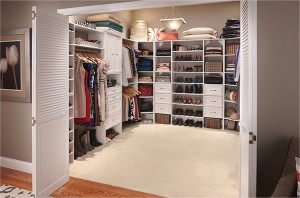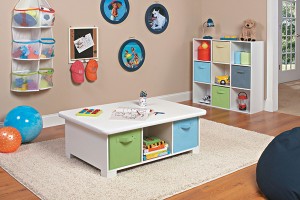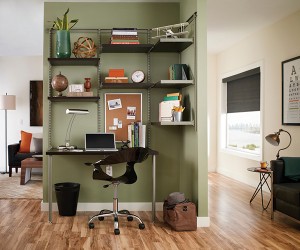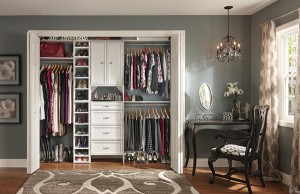Storage & Organization Tips
5 Ways to Love Your Bedroom Closet
 Position items that you use most upfront, placing out-of-season or seldom-used items higher or at the back.
Position items that you use most upfront, placing out-of-season or seldom-used items higher or at the back.- Divide larger closet walls in half. Assign one side to dresses or longer hanging items. Place a vertical tower unit in the center for sweaters, jeans, and tees. Use the other side for blouses or trousers. Add hooks for ties, belts, hats, and scarves.
- Fabric drawers or trays are perfect for hats, gloves, and accessories.
- Add shelving to display your most-used shoes. Keep off-season shoes further up or back in boxes, rotating as weather changes.
- A valet rod can save you time! Select and hang your outfit for the next day, or hang items that need dry cleaning or alterations.
3 Tips to Perfect Playrooms
 Label bins and cabinets with both words and pictures. Then, even young children can identify where things belong.
Label bins and cabinets with both words and pictures. Then, even young children can identify where things belong.- Help kids learn to think of others by having them periodically sort through toys to choose something to donate.
- Use cubeicals to divide the room into quiet versus active areas. And use shelves for books and to store construction toys, craft materials, or blocks within the bins.
4 Ways to Make Your Home Office Work
 Eliminate paper clutter by designating 2-4 bins, folders, or clipboards for sorting paper the minute it comes into the home. For example, create one bin for bills, one for filing, and one for papers that require action.
Eliminate paper clutter by designating 2-4 bins, folders, or clipboards for sorting paper the minute it comes into the home. For example, create one bin for bills, one for filing, and one for papers that require action.- Add calming colors, reserving bold color for splashes, like an accent wall, decorative bins, or a bright lampshade.
- Find a spot that allows the greatest opportunity to focus. Position yourself in front of a window if possible; and don’t forget to think about room traffic.
- Add a few items that make you smile and boost your mood: a plant, pictures of loved ones, or photos of a “bucket list” destination.
5-Step Recipe for Kitchen Organization
- Store dry goods in containers; use a labeler to indicate the product & expiration date.
- Clear counters regularly to clean. Then, only put back items that you use most often. For example, don’t waste counter space with infrequently used appliances (blender, panini maker, etc.).
- Store or donate seldom or “never use” items. Undecided? Put the item in a box in the garage; date and label the box. If you haven’t missed it in six months, give it away.
- Store kitchen tools and appliances in areas logical for their use. Place knives, mixing bowls, and kitchen utensils near the work space; and dishes and glassware near the sink or dishwasher.
- Use wire baskets to store pantry items that don’t easily stack, like snack bags, potatoes, or onions. id
 6: Average number of closets in the home
6: Average number of closets in the home
* Source: Consumer research conducted on behalf of ClosetMaid
#1: Toys are the biggest clutter problem in children’s bedrooms.
Source: Consumer research conducted on behalf of ClosetMaid
80% of clutter in the home is a result of disorganization, not lack of space.
Source: National Association of Professional Organizers
55 minutes a day: The amount of time the average American spends looking for things they know they own but cannot find.
Source: National Association of Professional Organizers
─ All tips and stats courtesy of ClosetMaid








